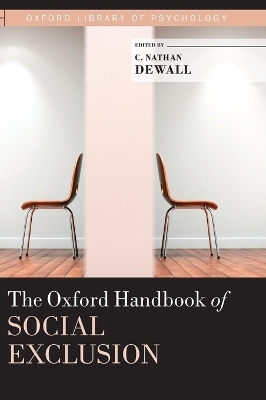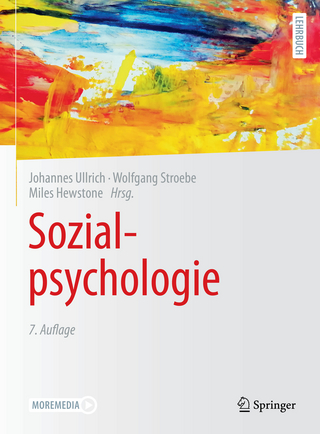
The Oxford Handbook of Social Exclusion
Oxford University Press Inc (Verlag)
978-0-19-539870-0 (ISBN)
Since its inception, the field of psychology has emphasized the importance of creating and maintaining social connections. Though theorists often disagree on how and why people form and maintain relationships, they agree on the importance of having a few positive and lasting relationships, and on the seriousness of social exclusion.
The Oxford Handbook of Social Exclusion offers the most comprehensive body of social exclusion research ever assembled. Bringing together contributions from leading scholars from a wide variety of theoretical perspectives, this volume explores:
- why people have a need to belong, why people exclude others, and how people respond to various forms of social exclusion.
- research on how social exclusion affects people according to their stage of development, their involvement in romantic relationships, and within their work relationships.
- the power of social exclusion in shaping a variety of behavioral and cognitive processes.
- research on how to reduce the often negative consequences of social exclusion.
This is an exciting time of proliferation in social exclusion research, as new findings spark new questions regarding the causes and consequences of social exclusion. Both stimulating and foundational, the current research and theories presented in this handbook represent a fertile area of study from which future insights can be gained.
C. Nathan DeWall, Ph.D., is Associate Professor, Department of Psychology, University of Kentucky.
Introduction and Overview ; 1. Emerging Perspectives on the Study of Social Exclusion ; C. Nathan DeWall ; Part Two: Basic and Historical Perspectives ; 2. Evolutionary Perspectives on Interpersonal Acceptance and Rejection ; Mark R. Leary and Catherine A. Cottrell ; 3. Ostracism and Stages of Coping ; Eric D. Wesselmann and Kipling D. Williams ; 4. Driven to Exclude: How Core Social Motives Explain Social Exclusion ; Michael S. North and Susan T. Fiske ; 5. The Multimotive Model of Responses to Rejection-Related Experiences ; Laura Smart Richman ; Part Three: Exclusion at the Group Level ; 6. Social Exclusion of Individuals through Interpersonal Discrimination ; Juan M. Madera and Michelle Hebl ; 7. Theory and Research on Social Exclusion in Work Groups ; Kristin L. Scott and Stefan Thau ; Part Four: Exclusion within the Family and Romantic Relations ; 8. The Dark Side of Divorce ; David A. Sbarra and Ashley E. Mason ; 9. The Importance of Feeling Valued: Perceived Regard in Romantic Relationships ; Justin V. Cavallo and John G. Holmes ; 10. Peer Rejection among Children and Adolescents: Antecedents, Reactions, and Maladaptive Pathways ; Jaana Juvonen ; Part Five: Individual Exclusion: Behavior and Cognition ; 11. Rejection and Aggression: Explaining the Paradox ; C. Nathan DeWall and Jean M. Twenge ; 12. How and When Exclusion Motivates Social Reconnection ; Daniel C. Molden and Jon K. Maner ; 13. Social Rejection Reduces Intelligent Thought and Self-Regulation ; Tyler F. Stillman and Roy F. Baumeister ; Part Six: Individual Exclusion: Physiological, Neural, and Emotional Responses ; 14. Cortisol Responses to Social Exclusion ; Sally S. Dickerson and Peggy M. Zoccola ; 15. Why Rejection Hurts: The Neuroscience of Social Pain ; Naomi I. Eisenberger ; 16. Social Pain ; Terry K. Borsook and Geoff MacDonald ; Part Seven: Exclusion across Individuals ; 17. Perceived Social Isolation Within Personal and Evolutionary Timescales ; John T. Cacioppo, Louise C. Hawkley, and Joshua Correll ; 18. The Social Stigma of Identity- and Status-Based Rejection Sensitivity ; Bonita London and Lisa Rosenthal ; 19. Depression and Suicide: Transactional Relations with Rejection ; Kimberly A. Van Orden and Thomas E. Joiner, Jr. ; 20. Individual Differences in Responses to Social Exclusion: Self-Esteem, Narcissism, and Self-Compassion ; Michelle R. vanDellen, Ashley Batts Allen, and W. Keith Campbell ; 21. Attention-Deficit/Hyperactivity Disorder and Challenges of Social Exclusion ; Amori Yee Mikami ; 22. Attachment Orientations and Reactions to Ostracism in Close Relationships and Groups ; Phillip R. Shaver and Mario Mikulincer ; Part Eight: Combating Social Exclusion ; 23. Social Connection and Seeing Human ; Adam Waytz ; 24. Attentional Retraining for Anxiety ; Norman B. Schmidt ; 25. Behavioral Mimicry as an Affiliative Response to Social Exclusion ; Jessica L. Lakin and Tanya L. Chartrand ; 26. Belonging Regulation Through the Use of (Para)social Surrogates ; Megan L. Knowles ; 27. The Birth and Death of Belonging ; Jeff Schimel and Jeff Greenberg ; 28. Looking Back and Forward: Lessons Learned and Moving Ahead ; C. Nathan DeWall
| Erscheint lt. Verlag | 7.3.2013 |
|---|---|
| Reihe/Serie | Oxford Library of Psychology |
| Verlagsort | New York |
| Sprache | englisch |
| Maße | 254 x 183 mm |
| Gewicht | 748 g |
| Themenwelt | Geisteswissenschaften ► Psychologie ► Arbeits- und Organisationspsychologie |
| Geisteswissenschaften ► Psychologie ► Sozialpsychologie | |
| Sozialwissenschaften ► Soziologie | |
| ISBN-10 | 0-19-539870-X / 019539870X |
| ISBN-13 | 978-0-19-539870-0 / 9780195398700 |
| Zustand | Neuware |
| Haben Sie eine Frage zum Produkt? |
aus dem Bereich


